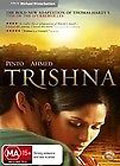
Directed by
Michael Winterbottom
117 minutes
Rated MA
Reviewed by
Lia McCrae-Moore

Trishna
Synopsis: Trishna (Frieda Pinto), the daughter of a poor rickshaw owner, meets Jay (Riz Ahmed), the heir of a wealthy British businessman at a party in Rajasthan. Jay is immediately besotted with Trishna and tracks her down. He encourages her to come and work for him at one of his father’s hotels. What ensues is a web of desire, obsession and disempowerment, a fateful and fraught relationship that is ultimately defined by its tragic end.Michael Winterbottom's latest film, a contemporary adaptation of Thomas Hardy’s 'Tess of the D’Urbervilles', is beautiful but despairing. I haven’t read Hardy’s novel so I went into the film completely unaware of what I was getting myself into. I left it feeling angry and hurt and warn you, if you’re not feeling strong enough to cope with an emotional battering then steer clear of this film until you are firing on all cylinders or in desperate need of releasing some much pent-up tension.
Trishna is set in today's India and Winterbottom has captured, in exquisite detail, a country caught in the midst of industrialisation. Its people are divided by gross disparities in wealth, education and class. Life is luxury living for one but surviving or scraping by for another. From the very beginning, Trishna is placed in a powerless position. She is indebted to and reliant on Jay for her family’s survival. He is her “saviour” but also ultimately her captor. This manipulative power dynamic is problematic and what leads to the demise of their fractured relationship.
Both Pinto and Ahmed give strong performances that do justice to the complex nature of their characters’ relationship. The scenery is extraordinary, as the shots move with grace and ease between rural poverty and ritzy hotels, busy Mumbai streets and quiet contemplative scenery. Bright colours and evocative sounds enliven every scene, increasing the intensity and luminosity of each character’s emotional encounter.
Winterbottom appears to take great pride in exposing the deep flaws of his protagonists’ personalities. In closely framing his actors’ gestures and actions, he simultaneously examines his characters’ internal thoughts and feelings and their responses to the outside world. With a particular focus on the intangible or the unspoken, he seems fascinated with the things that make our lives difficult and how each of us, in our different ways, negotiates the cards that we are dealt and in turn, deal ourselves. In this regard, Trishna is similar to many of the director’s other films but here, much like he did in The Killer Inside Me, he exposes a particularly heinous side of humanity, one with which I am still struggling to reconcile myself.
Winterbottom is sly. He slowly engrosses you by revealing the subtleties of his characters fraught relations, their foibles and ways of relating to the world. Then, once you are drawn in, he hits you hard with the unveiling of his catastrophic tragedy. Trishna is compelling, powerful viewing that knocks the stuffing right out of you.

Want more about this film?


Want something different?




